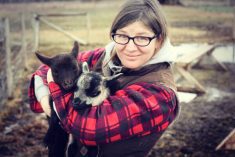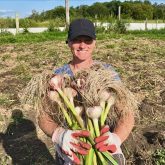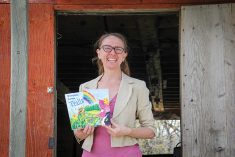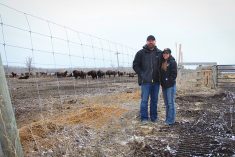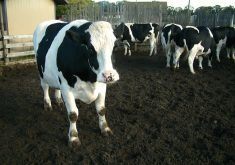Getting Gordon Bacon to talk about himself isn’t easy.
The recently retired longtime CEO of Pulse Canada, who will be inducted into the Canadian Agricultural Hall of Fame Nov. 21, prefers to talk about food, nutrition, health and sustainability.
It’s not surprising with his passion for pulses — leguminous edible seeds such as dry peas, lentils, chickpeas and beans that fix their own nitrogen, are high in protein and fibre, and low in fat.
There’s a direct line between pulse crops and nutrition, health and environment sustainability — boxes consumers and food companies increasingly want checked.
Read Also

What I learned about Manitoba eggs
Manitoba-laid eggs provide good, locally produced nutrition while supporting local farmers and the Canadian agriculture industry.
Those nutritional attributes have spurred a rapid growth in new pulse-processing plants such as Roquette’s pea facility, the world’s largest, at Portage la Prairie, Man.
Pulses are viewed as sustainable because they fix their own nitrogen, enhance crop rotations and produce protein that can supplement — or replace — meat.
But Bacon is just as fervent about change as a philosophy, making the case it has been key to Canadian pulses’ success.
After a nearly two-hour interview this spring, Bacon rhetorically asks:
“What’s the lesson in all of this? Nothing stays the same. Everything changes — farming, marketing.
“We like to stick to the stuff we know. Makes sense. But at times we have to have the stretch agenda. What is it we need to be ready for?”
That sums up Bacon’s four-decade career in agriculture — climbing a hill to see what’s coming and then doing it again.
The hall of fame calls that “visionary.”
“Gordon Bacon has driven transformational change in Canadian agriculture, most notably in Canada’s pulse industry,” the hall says in a July 12 news release. “Under his leadership, Canada became the world’s largest exporter of pulses.
“He played an influential role in the United Nations declaration of 2016 as International Year of Pulses and an annual World Pulses Day.”

It was a career highlight, says Bacon.
“It was this bold goal to get the United Nations to designate this,” he says. “We, as a world pulse industry, had to figure out how to work together.”
Work began in 2012 and Bacon quickly realized Pulse Canada couldn’t do it alone. That would mean co-operating with the United States — a major pulse crop competitor — represented by the U.S. Dry Bean, Pea & Lentil Council.
“That relationship was very bitter at that time,” says Bacon. “We had to change that. We had to develop trust.”
And they did. Bacon says the council’s chief, Tim McGreevy, is one of his best friends.
Bacon made the case that pulse growers on each side of the border had more connecting them than dividing them.
The International Year of Pulses took pulse crops to a new level, says Bacon. But it didn’t exceed expectations, he says, “because the expectations continued to outpace our ability to reach them.”
Strategic
Bacon credits the Canadian Agricultural Research Council (CARC) in the mid-1990s for inspiring him and Pulse Canada to change tack. It concluded Canadian agriculture would have difficulty competing in world markets on price alone and needed to focus on other consumer benefits.
“We took the advice of the Canadian Ag Research Council and I built a career out of it,” Bacon says. “But it was more than just lip service. It was about convincing grower groups to make investments in health and nutrition and grower groups making an investment in environmental sustainability. Some of these topics — sustainability for sure — are still controversial to some growers. That has been one of the challenges, but that’s been one of the rewarding things — not to look at the world as it is, but to look to where we could be or what’s coming at us.”
Farm organizations need to tackle issues of the day, but Bacon says they should also commit to the longer-term goals.
Pulse Canada did just that. There was some push-back early on, but Bacon told the board he didn’t want to work with an organization that didn’t share his goals.
“They gave me a lot of latitude on things that nobody was asking for,” he says.
“Boards and chairs have done bold things and I think it paid off. We haven’t been successful at everything… but we’ve moved the needle in the right direction.”

From its early work on heath, nutrition and sustainability Pulse Canada came up with the slogan: ‘Healthy People, Healthy Planet.’ Almost 16 years later the UN was making the same pitch.
It makes sense, Bacon says, because while most consumers aren’t interested in farming, they do care about food.
“So what we have to do is make sure the story that we have fits in a food perspective,” he says. “That’s a change for us (in agriculture).
“What excites me now is a shift. It’s not promoting pulses because pulses or wheat or Canadian beef or whatever has to shift its thinking to food and dietary approaches and how we need to be ready and what the plan is to be better. And we can be better.”
Consumers ultimately get what they want and they want agriculture to have a less harmful impact on the environment, Bacon says. That doesn’t necessarily mean less fertilizer or pesticides, but it does mean improved stewardship.
“That’s the opportunity. That to me is the future of food.”
A journey
It’s more than 3,000 km from Ogema, Sask., where Bacon grew up on a family farm, to the UN in New York City. There were lots of stops between. After high school Bacon majored in agronomy at the University of Saskatchewan earning a degree in agriculture in 1981.
After graduating he took a full-time position with Alberta Agriculture as a district agriculturalist in Rimbey, Alta. But he didn’t start until the fall so he could work that summer for the Canadian Wheat Board, which had awarded him a scholarship.
Learning about the grain industry helped in future jobs.
Bacon also became a full-time partner with his brother in the family farm, providing part-time labour when he could.
In 1985 Bacon took a term position as the information officer at Agriculture Canada’s Swift Current research station. In 1987, as the term was ending, he began looking for a new job. Bacon told Brian Oleson, one of his wheat board contacts. Oleson told Harold Bjarnason, a former board employee who then was associate deputy minister of agriculture. Bjarnason, who was seeking to fill a position in the federal Agriculture Department, told Charlie Mayer, the minister of grains and oilseeds, who wanted a senior policy analyst to work for his office.
Bacon applied for both jobs and was offered the position with Mayer.
“It was an unusual path to working in a political office,” Bacon says, noting he was an Ag Canada employee not a political appointee. “It wasn’t through family politics that I got there…”

Bacon worked on some big projects including two Canadian Special Grains Programs and the Crop Drought Assistance Program. Ottawa was shovelling billions of dollars out the door.
“These were really some tough times on the farm that started out with drought and then really low prices,” Bacon says.
Those ad hoc programs were the genesis for a long line of farm income stabilization programs culminating in AgriStability and AgriInvest today.
“Charlie was a real mentor,” Bacon says. “I learned so much by watching him,” including not to take oneself too seriously.
Bacon was impressed with Mayer’s people skills. One time Bacon was trying in vain to get Mayer, who was visiting with a hotel housekeeper, to a meeting.
“He just snapped at me and said, ‘I am busy talking to this lady,’ Bacon says. “She just glowed.
“He gets human relations…”
As interesting and exciting as it was to work in Mayer’s office, after 2-1/2 years, Bacon was ready for a new job. In a 1989 interview with this reporter, published in the Manitoba Co-operator Bacon acknowledged it was a pressure cooker gig.
Working for Mayer was often a seven-day-a-week job, Bacon says during our recent interview.
“There was a time when I would schedule a time in my week to go buy groceries.”
But Bacon adds, it was made easier knowing he had Mayer’s support.
“Charlie said, ‘even if you’re wrong I have your back.’ So you really felt as a team.
“Trust in the people you’re working with is pretty key. Charlie led by example in terms of trust and hard work, things I think are important in any career for anybody. He wasn’t always right either and neither am I. We are all human.”
Bacon landed at the Canadian Wheat Board, where he worked from 1990 to 1997 serving in several positions, including director of country services and director of market development.
The CWB was changing too, going from delivery quotas to bring in grain, to contract calls and issuing estimated pool returns.
There was even an internal discussion to have the CWB take possession of grain at port instead of in the country — something Bacon supported because it would reduce operating costs.
Road warrior
In 1997 Bacon joined Pulse Canada, which represents Canada’s pulse growers, traders and processors. He stepped down in April, 24 years later.
It was a rewarding and challenging job, but Bacon admits the travel schedule was gruelling.
Bacon doesn’t know how many miles he travelled for Pulse Canada “but I have the little plastic airplane from Canadian Airlines and the little plastic airplane from Air Canada — you know the million-mile club.”
As a member you get to board flights before other passengers.
“One time I was on the plane and closed my eyes and fell asleep,” Bacon says. “Somebody tapped me on the shoulder. It was the Air Canada concierge and she said, ‘happy birthday Gordon,’ and handed me a card and a chocolate airplane.
“The sad part was only Air Canada remembered it was my birthday.
“People always ask me where my favourite place is and I say, ‘it’s home.’”
That said, Bacon hopes in retirement to visit some of the places he travelled to and see more this time.
In July he was flying to the UN Food Summit in Rome to speak on his favourite topic: food and its connection to health, nutrition and sustainability.
“But I want to do other things… like kayak in four-foot waves in Clear Lake,” Bacon says. “I don’t think I’ll do that when I am 70 but I’ll do it when I am 62.”








